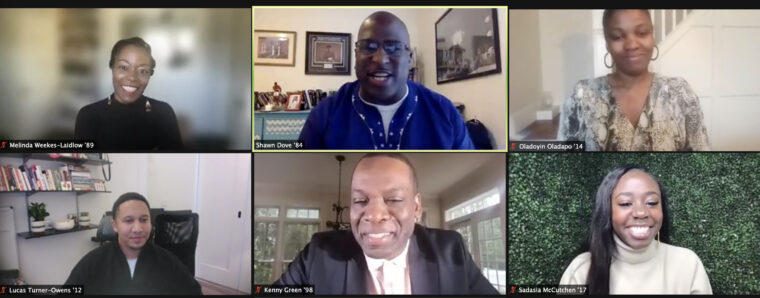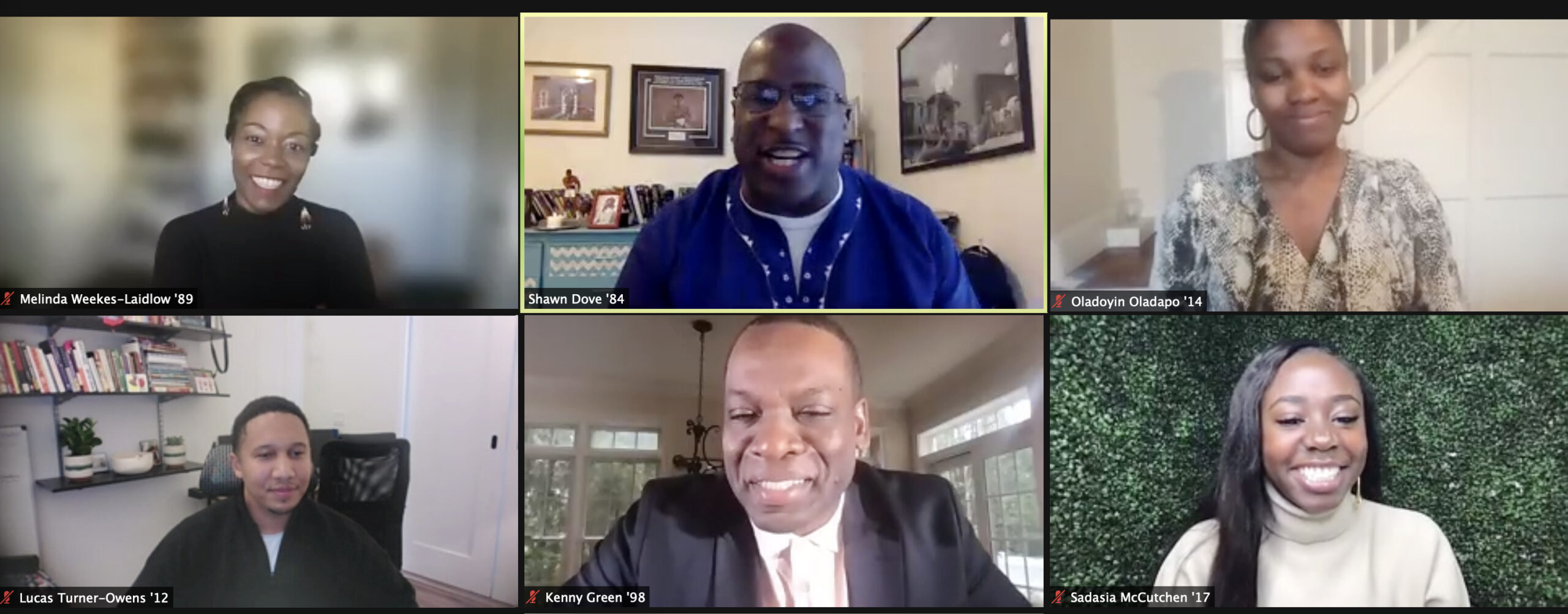Alumni Discuss Black Entrepreneurship at 29th Annual Dwight L. Greene Symposium


Like many alumni entrepreneurs, Kenny Green’s career launched from a “dorm room business” during his junior year at Wesleyan. Green ’98, an economics major, teamed up with his classmate Paul Freeman ’98 and started selling keychains with ‘Wesleyan’ stitched in black thread.
“[At the time] these big long keychains came in style—the dog tag keychain. So I said, ‘Hey, how can we put Wesleyan on this?'” Green asked.
Green, who is the founder of Green Passion Projects, an organization that consults with professional athletes and entrepreneurs to create effective business strategies, joined five other Wesleyan alumni panelists to lead the 29th Dwight L. Greene Symposium on Oct. 27. Moderated by Melinda Weekes-Laidlow ’89, the group discussed the topic of Black entrepreneurship and specific strategies these alumni leaders use to build entrepreneurial ventures and ecosystems. Green and Weekes-Laidlow were joined by Sadasia McCutchen ’17, Lucas Turner-Owens ’12, Shawn Dove ’84, and Oladoyin Oladapo ’14 for the virtual event.
“I think my entrepreneurial roots started right at Wesleyan,” said Green, who worked in public accounting after graduation. “I became a CPA .. but the calling to entrepreneurship came along.”
Since then, he’s worked with NBA star Charlie Ward on a community fundraiser; he’s consulted with Grammy-winning songwriter Steven Battey on a social impact music video featuring Snoop Dogg and partnered with the Jackie Robinson Park of Fame on a holiday party for underserved families. “I’m just happy with everything that I’m doing every single day,” Green said.
Similarly, Oladapo ’14 started her entrepreneurial endeavors in college. During her junior year, and with help from Wesleyan’s Patricelli Center for Social Entrepreneurship, she co-founded JooMah, a web platform focused on the Sub-Saharan Africa job placement market that quickly connects job seekers with nearby relevant job opportunities. After brief stints working as a content strategist for companies like Snapchat and Essence Magazine, Oladapo founded a culturally inclusive, thought-provoking multicultural children’s book company, Idunnu Studios. And since 2020, she’s been busy working as the CEO of Window, a user-customized shopping search engine.
“One of the things that inspired me so much to build my own tech startup is because I wanted to see the face of a Black person—a Black woman—building a product that was for everyone, that would be in homes all around the country, and all around the world,” she said.
Investors often question Oladapo’s endeavors, assuming she’s only catering to a small niche Black market.
“They suppose that just because I’m a Black founder that I’m only building things for Black people,” she said. “That will always be a priority for me and for the community, but Black entrepreneurship is anything and anywhere a Black person chooses to build a business. To build, to create, to innovate. Through Black entrepreneurship, we have to make sure that we’re changing the notion that we’re not only serving ourselves.”
Sadasia McCutchen ’17 explained how at the age of 8, she started an afterschool program for kids at her elementary and middle school. And by her junior year at Wesleyan, the government and African American studies double major co-founded Cocobee, a handcrafted, all-natural organic body care product line, also in her dorm room.
After working as an intern, and then a strategic analyst partner for Google, she joined CapitalG, an independent growth fund that helps entrepreneurs accelerate the growth of their businesses.
“Entrepreneurship is definitely through and through my veins in my being,” she said.
Weekes-Laidlow, who is president of the consulting company Weekes In Advance Enterprises, helps non-profits with meeting design, goal-setting, change consulting, equity and inclusion, and collaborative skills. She also is the founder and CEO of Beautiful Ventures, a social enterprise that influences popular culture, disrupts anti-blackness, and elevates perceptions of Black humanity.
“There’s no pop culture without Black culture,” Weekes-Laidlow said. “So why don’t we flex our creative genius but couple it with our entrepreneurial savvy so that our stories can get to the market without having to be held up by Hollywood, gatekeepers, or green lighters?”
Dove, who is the CEO of the Campaign for Black Male Achievement, an organization committed to improving the life outcomes for Black men and boys, suggests students interested in entrepreneurship “get comfortable with failure and your relationship to failure.”
“If you reframe your failure, you can reframe your future,” he said.
While the panelists’ careers went in very different directions, they all agree that Wesleyan was heavily instrumental to their entrepreneurial endeavors.
“Wesleyan is where you find your tribe,” Weekes-Laidlow said. “There’s resources, people who get you. Wesleyan is a particular kind of place.”
Now entering its 29th year, the Dwight L. Greene Symposium honors Dwight L. Greene ’70 as a memorial and tribute to his life and work as a professor of law, mentor, and friend. Each year, presenters are selected from among Wesleyan’s alumni, faculty, and friends who have distinguished themselves in their professions, to share on topics of importance for black alumni, alumni of color, and the Wesleyan community at large.
This symposium provides an opportunity to hear from a diverse set of voices while facilitating networking and reconnecting with members of the Wesleyan community. with each other and ensures that diversity remains an important part of the Wesleyan experience.

